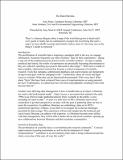| dc.description.abstract | There’s a famous allegory about a map of the world that grows in detail until every point in reality has its counterpoint on paper; the twist being that such a map is at once ideally accurate and entirely useless, since it’s the same size as the thing it’s meant to represent 1.
Introduction
The proliferation of scientific data is inspiring a paradigm shift in the way we manage information. Scientists frequently use other scientists’ data for their experiments 2, taking a step out of the traditional process known as the scientific method 3. As data is rapidly produced and shared, the results of experiments are practically becoming disseminated as they are collected, speeding up a process that used to take longer 4. With such a wealth of data available, information retrieval has become a critical component of scientific research. Tools like metadata, sophisticated databases and search engines are desperately trying to keep pace with the changing world 5. Furthermore, there are social and legal issues to consider. What data can be shared and disseminated? Who owns data? What about “facts” that have been extracted from years of experimentation or using patented devices? Traditionally, so-called facts have not been copyrightable, resulting in laws that become blurred 6.
Another issue affecting data management is how to handle data as an object. Librarians are used to the book/journal model 7. Open Access, a movement that started in the early 1990s in an effort to make published articles freely available to the public, is now extending its reach to data 8. As part of a task force at MIT, librarians interviewed researchers to get their perspectives on data, with the goal of gathering ideas on how to assist the researchers. In addition, librarians are submitting a data set to MIT’s institutional repository, DSpace, in an effort to investigate the technical challenges presented by data storage. This experience will provide insight into the technical and social issues librarians can address with expertise. As librarians become more skilled with data management, they will be able to better advise and assist scientists, opening up new collaborations between librarians and their academic communities. | en |
